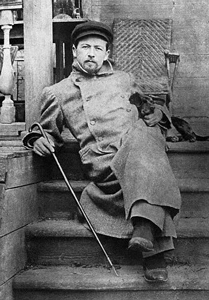Anton Chekhov (January 29, 1860 - July 15, 1904
 January 29, 2010 marked the 150th birthday of Russian writer Anton Chekhov, and productions of the author’s work are planned around the world.
January 29, 2010 marked the 150th birthday of Russian writer Anton Chekhov, and productions of the author’s work are planned around the world.
Remembered most for his more serious plays, “The Sea-Gull,” "The Cherry Orchard," and "Three Sisters," Chekhov’s short stories are hidden gems of humor and insight. A photographic exhibition currently at the Mosfilm motion picture studios in Moscow has gathered stills from screen adaptations of Chekhov’s stories. (Imdb.com lists 286 of them, beginning in 1911.)
The third child in a family of six, Chekhov’s grocer father went bankrupt, and Anton began writing stories for money as a medical student in Moscow. While supporting his family as a doctor, he became Russia's most beloved storyteller, at least next to Tolstoy.
He also traveled to the Sakhalin Island penal colony in 1890, advocating for reform in treatment of prisoners; organized relief for victims of the famine and outbreaks of 1892; built three schools, a fire station, and a clinic; and donated his medical services to peasants for miles around, despite frequent recurrences of his own tuberculosis.
Hashish makes a surprising appearance in a dinner party conversation in Chekhov's story “A Woman's Kingdom” (1895):
After the third course Lysevitch said, turning to Anna Akimovna: "The fin de siècle woman--I mean when she is young, and of course wealthy--must be independent, clever, elegant, intellectual, bold, and a little depraved. Depraved within limits, a little; for excess, you know, is wearisome. You ought not to vegetate, my dear; you ought not to live like every one else, but to get the full savour of life, and a slight flavour of depravity is the sauce of life. Revel among flowers of intoxicating fragrance, breathe the perfume of musk, eat hashish, and best of all, love, love, love."
Other Russian writers Leon Tolstoy and Ivan Turgenev, contemporaries of Chekhov, mention “fragrant” hemp fields in their stories. Chekhov wrote, “My holy of holies is the human body, health, intelligence, talent, inspiration, love, and absolute freedom—freedom from violence and falsehood, no matter how the last two manifest themselves.”
In Chekhov’s story “The Black Monk,” a man named Kovrin has hallucinations and conversations with an imaginary Black Monk, remembered from a legend as coming from Syria or Arabia, who he first sees in a field of rye. (Moldy rye yields ergot, the fungus that makes LSD. The Wise Man of the East is a persistent figure in Western literature, and is often associated with hashish.)
The Monk tells him, “Exaltation, enthusiasm, ecstasy -- all that distinguishes prophets, poets, martyrs for the idea, from the common folk -- is repellent to the animal side of man -- that is, his physical health. I repeat, if you want to be healthy and normal, go to the common herd."After Kovrin is shipped off to a doctor by his wife and father-in-law, he laments, "How fortunate Buddha, Mahomed, and Shakespeare were that their kind relations and doctors did not cure them of their ecstasy and their inspiration.”
Chekhov influenced and was praised by George Bernard Shaw, Virginia Woolf and Ernest Hemingway (grudgingly), who described Chekhov as writing "the way one person relates to another the most important things in his life, slowly and yet without a break, in a slightly subdued voice." At a time when “maudlin soul searching was the intellectual fashion,” wrote Lillian Hellman in an introduction to his letters, Chekhov was “a pleasant man, witty and wise and tolerant and kind, with nothing wishy-washy in his kindness nor self righteous in his tolerance, and his wit was not ill-humored. He would have seen through you, of course, as he did through everybody, but being seen through doesn’t hurt too much if it’s done with affection.”
Chekhov is particularly loved in Britain, where theaters tirelessly stage his plays. "For us in England, it seems that Chekhov is almost an Englishman, although of course he is 100 percent Russian,” says British Chekhov specialist Rosamund Bartlett, who oversaw a Chekhov festival at London's Hampstead Theater this month. “We are famous for our rather ironic humor, and Chekhov's work abounds with this sense of irony and humor." Moldovan theater director Mihai Fusu, who recently staged "The Seagull" in the Romanian city of Braila, says that Chekhov “touches on almost all aspect of human relations."
Chekov's character Nina in “The Seagull” says, “In me the consciousness of man has joined hands with the instinct of the animal; I understand all, all, all, and each life lives again in me.”